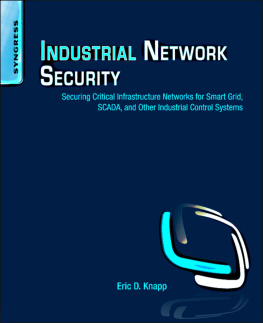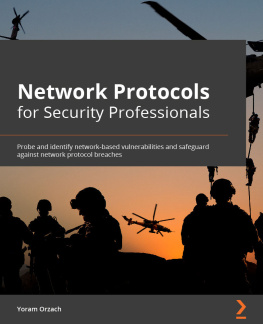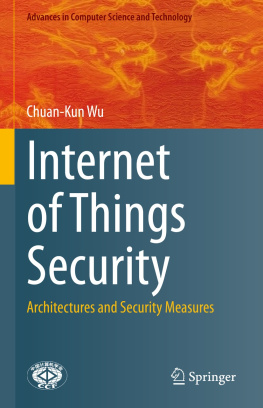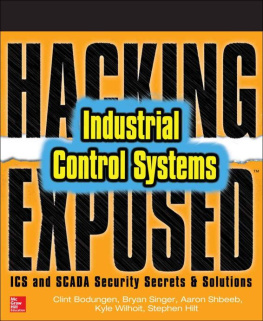Front-matter
Industrial Network Security
Securing Critical Infrastructure Networks for Smart Grid, SCADA, and Other Industrial Control Systems
Industrial Network Security
Securing Critical Infrastructure Networks for Smart Grid, SCADA, and Other Industrial Control Systems
Eric Knapp
Technical Editor
James Broad

AMSTERDAM BOSTON HEIDELBERG LONDON NEW YORK OXFORD PARIS SAN DIEGO SAN FRANCISCO SINGAPORE SYDNEY TOKYO

Syngress is an imprint of Elsevier
Copyright
Acquiring Editor: Angelina Ward
Development Editor: Matt Cater
Project Manager: Jessica Vaughan
Designer: Joanne Blank
Syngress is an imprint of Elsevier
225 Wyman Street, Waltham, MA 02451, USA
2011 Elsevier Inc. All rights reserved
No part of this publication may be reproduced or transmitted in any form or by any means, electronic or mechanical, including photocopying, recording, or any information storage and retrieval system, without permission in writing from the publisher. Details on how to seek permission, further information about the Publishers permissions policies and our arrangements with organizations such as the Copyright Clearance Center and the Copyright Licensing Agency, can be found at our website: www.elsevier.com/permissions.
This book and the individual contributions contained in it are protected under copyright by the Publisher (other than as may be noted herein).
Notices
Knowledge and best practice in this field are constantly changing. As new research and experience broaden our understanding, changes in research methods or professional practices may become necessary. Practitioners and researchers must always rely on their own experience and knowledge in evaluating and using any information or methods described herein. In using such information or methods they should be mindful of their own safety and the safety of others, including parties for whom they have a professional responsibility. To the fullest extent of the law, neither the Publisher nor the authors, contributors, or editors, assume any liability for any injury and/or damage to persons or property as a matter of products liability, negligence or otherwise, or from any use or operation of any methods, products, instructions, or ideas contained in the material herein.
Library of Congress Cataloging-in-Publication Data
Knapp, Eric.
Industrial network security : securing critical infrastructure networks for Smart Grid, SCADA, and other industrial control systems / Eric Knapp.
p. cm.
Summary: This book attempts to define an approach to industrial network security that considers the unique network, protocol and application characteristics of an industrial control system, while also taking into consideration a variety of common compliance controlsProvided by publisher.
Includes bibliographical references.
ISBN 978-1-59749-645-2 (pbk.)
1. Process controlSecurity measures. 2. Computer security. I. Title.
TS156.8.K58 2011
670.427dc23
2011018442
British Library Cataloguing-in-Publication Data
A catalogue record for this book is available from the British Library
ISBN: 978-1-59749-645-2
Printed in the United States of America
11 12 13 14 15 10 9 8 7 6 5 4 3 2 1
For information on all Syngress publications visit our website at www.syngress.com.
About the Author
Eric D. Knapp is the Director of Critical Infrastructure Markets for NitroSecurity, where he leads the identification, evaluation, and implementation of new security technologies specific to the protection of critical infrastructure, Supervisory Control And Data Acquisition (SCADA), and industrial control networks.
Eric has 20 years of experience in Information Technology, specializing in industrial automation technologies, infrastructure security, and applied Ethernet protocols as well as the design and implementation of Intrusion Prevention Systems and Security Information and Event Management systems in both enterprise and industrial networks. In addition to his work in information security, Eric is an award-winning author. He studied English and Writing at the University of New Hampshire and the University of London and holds a degree in communications.
About the Technical Editor
James Broad (CISSP, C|EH, C)PTS, Security+, MBA) is the President and owner of Cyber-Recon, LLC, where he and his team of consultants specialize in Information Security, Information Assurance, and Certification and Accreditation and offer other security consultancy services to corporate and government clients.
As a security professional with over 20 years of real-world IT experience, James is an expert in many areas of IT security, specializing in security engineering, penetration testing, and vulnerability analysis and research. He has provided security services in the Nations most critical sectors including defense, law enforcement, intelligence, finance, and healthcare.
James has a Masters of Business Administration degree with specialization in Information Technology (MBA/IT) from the Ken Blanchard College of Business, Bachelors degrees in Computer Programming and Security Management from Southwestern University and is currently a Doctoral Learner pursuing a PhD in Information Security from Capella University. He is a member of ISSA and (ISC)2. James currently resides in Stafford, Virginia with his family: Deanne, Micheal, and Temara.
Foreword
Dr. Anton A. Chuvakin
Security Warrior Consulting
One of the most mysterious areas of information security is industrial system security. No other area of information security contains that many myths, mistakes, misconceptions and outright lies. Information available online, while voluminous, will only lead information security professionals and industrial systems professionals to more confusion and more misconceptionswhich may result in not only costly, but also life-threatening, mistakes.
What raises the mystery even higher is that the stakes in the area of industrial security are extremely high. While the loss of trade secret information may kill a business, the loss of electricity generating capability may kill not just one person, but potentially thousands.
And finally the mystery is solvedwith this well-researched book on industrial system network security.
The book had a few parts of particular interest to me. I liked that the book covers the myth of an air gapnow in the age of wireless, the air gap is not what it used to be and should not be assumed to be the absolute security. I also liked that safety versus security is covered: industrial engineers might know more about the former while my InfoSec colleagues know more about the latter. Todays interconnected industrial systems absolutely need both! Finally, I also liked the books focus on risk and impact, and not simply on following the regulatory minimum.







 AMSTERDAM BOSTON HEIDELBERG LONDON NEW YORK OXFORD PARIS SAN DIEGO SAN FRANCISCO SINGAPORE SYDNEY TOKYO
AMSTERDAM BOSTON HEIDELBERG LONDON NEW YORK OXFORD PARIS SAN DIEGO SAN FRANCISCO SINGAPORE SYDNEY TOKYO 
